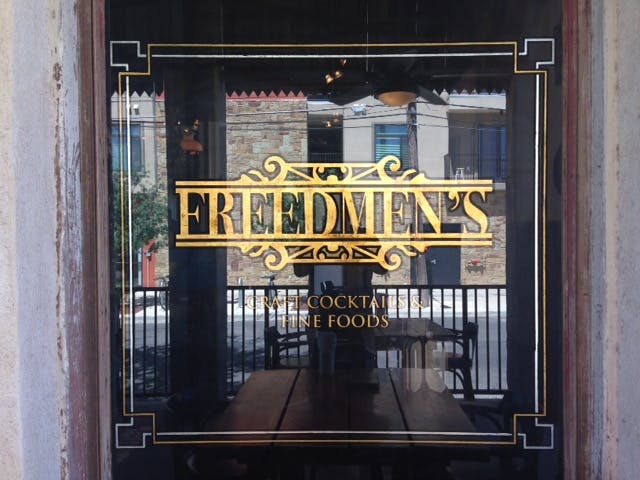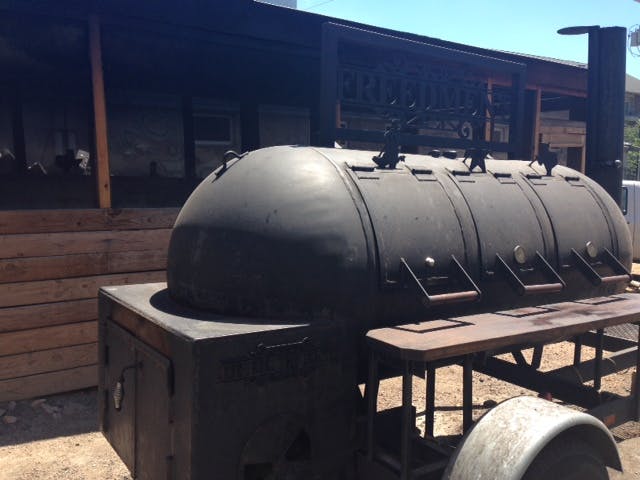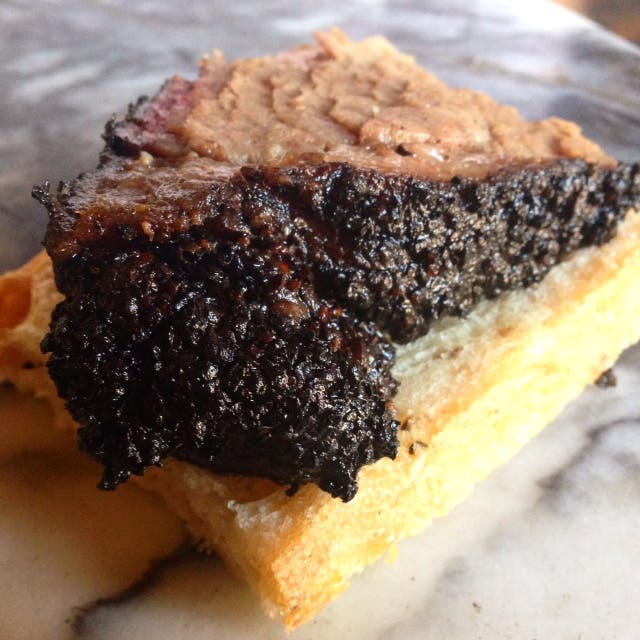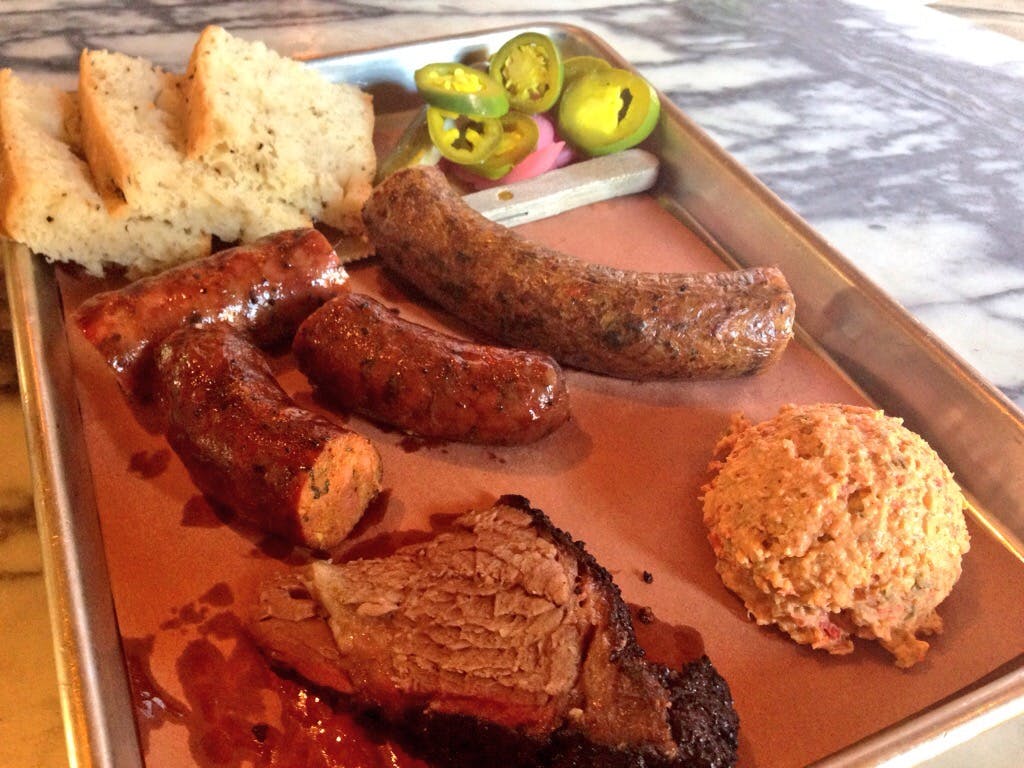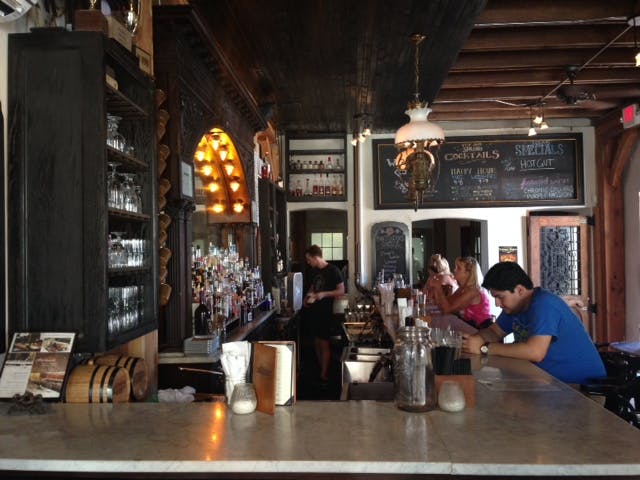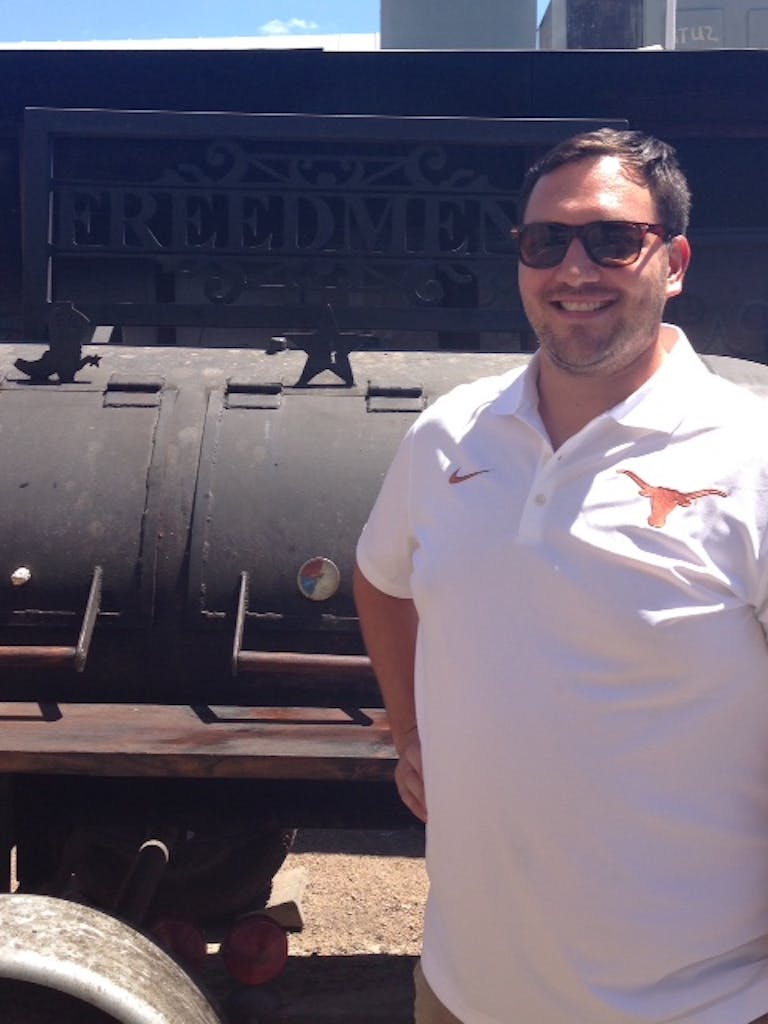 Pitmaster: Freedmen’s Bar; Opened 2012
Pitmaster: Freedmen’s Bar; Opened 2012
Age: 29
Smoker: Indirect Heat Wood-Fired Pit
Wood: Post Oak
Even at his young age, Evan LeRoy doesn’t want for confidence. He once told viewers of American Grilled, a cooking show he was competing on, that “I can cook anything to perfection on any grill.” It was a bit tongue-in-cheek, but he’s certainly good with a smoker. As a formally trained chef, there’s also plenty more he can join a kitchen that just barbecue.
LeRoy is at the helm of Freedmen’s Bar, which is quickly becoming one of Austin’s most highly respected barbecue joints. He and fellow pitmaster Chris McGhee are the creative team responsible for dishes like the smoked jalapeño cheese spread and a whole host of homemade sausages. They make a brisket with a crunchy bark like nobody else, and that coupled with loads of the great barbecue have made them our choice as the official newcomer at this year’s Texas Monthly Barbecue Festival.
Daniel Vaughn: Where are you originally from?
Evan LeRoy: I was born in Southern California, but I moved here when I was five years old. I claim that I’m from Austin. I grew up here.
DV: Did you grow up eating the barbecue around here?
EL: Definitely. I grew up eating barbecue from the backyard from my dad, then in Lockhart and the Salt Lick.
DV: Did you eat barbecue in Austin?
EL: Not very often. Maybe Ironworks every now and then. We’d go to County Line sometimes to eat the bread and beef ribs.
DV: What’s it feel like being part of the movement that’s bringing people to Austin just to eat barbecue here?
EL: I feel like it’s a big responsibility. It’s not just any other type of food we’re cooking. It’s a tent pole of the culture here. It’s part of what I grew up with and now we’re exposing that to people all over the world. We have an Australian working with us right now.
DV: When people email me from outside the country looking for someone to learn Texas barbecue from, I know you’re always open to it.
EL: Yeah. I guess some people don’t want to teach, but I don’t get that.
DV: Have you thought about the fact that after a while you’re going to find LeRoy style barbecue all over the world.
EL: Yes. Right now that’s basically all of Australia. We have one continent covered.
DV: What other countries have been represented by people rolling through here looking for some barbecue know-how?
EL: We have three spots in Australia. We also had a guy from Hungary, and I just got another message this week from a Russian dude who is looking to talk to us.
DV: Where do your barbecue influences come from?
EL: I would say the restaurant that influenced me the most was the restaurant I first started at in Austin called Hudson’s on the Bend. I worked there when I started in culinary school. Their smokehouse is a shack with a fire in the corner and meat racks on each side. You had to literally go into it with the meat.
DV: So, there was no mistaking when you got home from work where you had been.
EL: Big time. The chefs there stressed cooking from scratch.
DV: Where did you go from there?
EL: I moved to New York. I did a little in fine dining, but quickly realized that wasn’t for me.
DV: But you didn’t go to New York for any formal education since that was already done, right?
EL: Right. I actually went up there to be a writer and just work in kitchens to pay the bills.
DV: Were you planning to write about barbecue, perhaps?
EL: I was going to write about food. That’s why I went to culinary school, to be an expert at something. It was already interesting to me, and I realized I was kinda good enough, so one day it just switched for me.
DV: But you moved to New York with the intention of becoming a writer?
EL: Well, my girlfriend at the time lived up there. I kinda followed a girl and kinda followed the food.
DV: Where was your first restaurant job in New York?
EL: I started at Craft, but I really didn’t like it. I just wasn’t into the fine dining. I wasn’t into getting yelled at on a daily basis, or coming in to work a few hours before I was able to clock in. I left that place for a more corporate restaurant called Hillstone. It was a useful experience. I learned how to bake bread and make sushi there. It paid better than any other hourly wage I’ve ever seen for a cook, but I saw there was no room to move up there. Then I started working the counter at Hill Country Barbecue. I was basically telling New Yorkers how much a pound was day after day. “How much is a pound again?” “Too much for one person to eat.”
DV: You didn’t start off cooking there?
EL: I was at first the one talking to customers and grabbing the meat from the cutters. Then I was carving meat, and then cooking. The pitmaster quit one day, and I was already cooking, so I guess I had proved myself.
DV: You first learned how to cook barbecue on an Ole Hickory smoker?
EL: No, I first learned how to cook barbecue here in Austin with my dad.
DV: What kind of smoker did he use?
EL: An old offset that he got from his old partner that he used to cook in competitions with.
DV: What do you remember him cooking?
EL: Ribs and some brisket, but definitely a lot of pork ribs and beef back ribs.
DV: The menu at Hill Country was familiar to you as someone who had eaten in Lockhart a number of times, but the cooking method was quite a bit different from what you were used to.
EL: It was different. I embraced it while I was there. I hadn’t really been introduced to any other way to cook commercially.
DV: What brought you back to Texas?
EL: I knew if I wanted to cook great beef, I had to come back here. This is where the big fish play.
DV: It’s funny that a few years ago that wasn’t true, but now you came back into an Austin where there was so much great barbecue to compete with.
EL: Even just a few years ago, Aaron [Franklin] had just moved to his restaurant. Freedmen’s, la Barbecue, and Micklethwait all opened up a few months apart, and now it’s all considered some of the best barbecue in the state and in the country.
DV: How did you come upon this position here?
EL: I was looking at opening my own place, similar to Valentina’s. I wanted to do half the menu as barbecue by the pound, and the other half would be tacos and everything that goes good with barbecue. I was buying a bunch of used equipment off of Craigslist. When I was looking for some I found this job and I applied for it.
DV: What was the interview like?
EL: I cooked brisket, a rack of ribs, and some sausage for the owner Cuatro. He came over to eat it. After a few bites, he was like “all right.”
DV: Was there a resume involved?
EL: Sure. We did all that stuff before the tasting.
DV: Looking back on those items that you cooked, how far off are they from what you’re cooking now?
EL: Very different. We’ve grown a lot, and much of that is due to Chris McGhee.
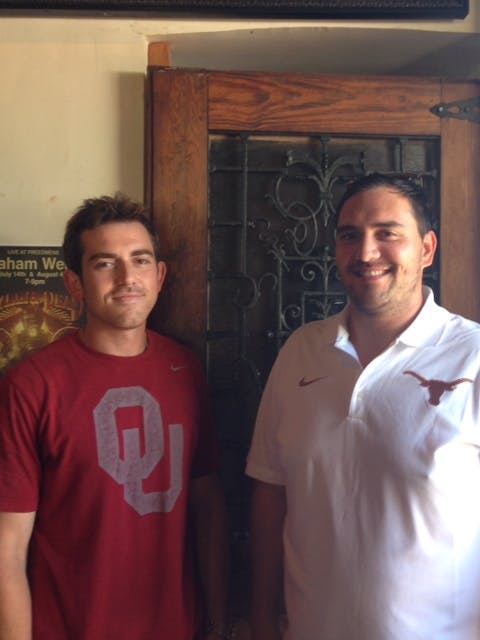
DV: When did you bring him on?
EL: In February of 2014. He was working at la Barbecue. We put an ad out, and Chris came to us. Looking back that was one of the days that put us on a new path. I had opened the place with an old friend of mine who was a sous chef. He helped us out a lot, but he didn’t have the supreme desire to cook barbecue the way that Chris and I do. The food has gotten a lot better since Chris came on.
DV: Have you seen any pushback from customers on the limits you try to push with barbecue?
EL: Not really. You might think people would scoff at some other meat because it’s not brisket, but the bottom line is that if you make it good, people are going to eat it. The very first weekend we did the farmers market we brought goat sausage, and literally every week since people ask “When are you bringing back the goat sausage?”
DV: You also do great sides, desserts, and appetizers. Not only do you cook them well, but you find a way to bring the barbecue flavor into all of them.
EL: That’s important to me. When I’m cooking with fire I want everything to touch the fire. We also don’t have a lot of cooking equipment back in the kitchen. We don’t have a range. We have a big propane burner outside where we can cook a bunch of potatoes. We have to put everything in the barbecue pit because we don’t have room to cook it anywhere else.
DV: Do you think if you had a bigger kitchen you might not have things like smoked beets on the menu?
EL: Maybe, but we’d probably have more than a dozen items on the menu too. At first we made our own charcuterie. We had a complicated sauce and a more complicated potato salad. Due to food costs and other things we had to tighten up how we make some of it. It’s been an education for myself as a chef – how to get the most money out of your ingredients, and also to make what your customers want and not just what you like. We were reaching a little bit, and now we’ve brought it back. We brought the focus to the meat which is the most important. We have a good staff now too.
DV: One of the items you focus on is sausage making. Did it start out that way?
EL: From the get go I said we had to make sausage here. Initially, we would just grind up all the scraps and put them into a casing. We were sure it would just taste good. It took a lot of practice and trial and error from there. Now we’ve got it down to a point where we can plug in any meat, any liquid, and any seasoning and it’s going to turn out a nice texture.
DV: You also have found an interesting way to deal with leftover brisket – brisket boudin. That was some incredibly smoky brisket in there.
EL: Our goal is to run out at the right time every day, but it never happens. We’re going to take a big hit on it if we don’t figure out some other way to use it. At first we started out with these vegan beans on the menu, but after a while, I was like “Screw it. We’re putting the leftover meats in the beans.”
DV: The smoke beets are still on the menu for any vegetarians.
EL: Yes.
DV: You started off with more meat options on the regular menu. Now that you’ve cut some out, how do you determine when to give up on a menu item?
EL: Pork belly was on the menu at one time, but it didn’t sell. Now every time we get a bunch of requests for pork belly, we put it on the special menu and nobody orders it. There was also a lot more pork than beef on the menu, and this is a Texas barbecue place.
DV: You’ve got a great restaurant setting here. There aren’t many options for eating barbecue for dinner in Austin, but this is a great one where you can eat indoors. I do wonder though if you feel hemmed in by the small size of the place?
EL: Not really since we have so much space upstairs and outside. It’s just this room, we call it the saloon, that is small. I feel more hemmed in by what people think is barbecue on a daily basis. I want to see a barbecue place that doesn’t serve brisket every day. People need to respect every cut from the whole cow. You could smoke a strip loin, but then there’s beef shanks or a whole steamship.
DV: When does the steamship make it on the special menu?
EL: I have no idea, but I’m going to figure it out.
DV: What are the boundaries that you haven’t pushed yet? Taking brisket off the menu?
EL: Here? No. Absolutely not. Maybe at a place that we would open down the road.
DV: What do you see that’s next for Freedmen’s?
EL: The thing that we’re really focused on is the Texas Monthly Barbecue Festival.
DV: What are you cooking for it?
EL: We’ll be cooking a couple sausages and brisket, and maybe a dessert. We’ll see.
DV: When you first took the job at Freedmen’s, free reign of this place was given to you. Did that make you nervous?
EL: It made me extremely nervous, and still does on a daily basis.
DV: Is there a point over the last few years that you’ve come to some level of comfort with what you’re doing here?
EL: Of course, but every time I think that, I’ll try something that someone else made or taste something that Chris did and realize that I need to get better. There’s always room to grow.
DV: Do you ever look at my job and realize how much easier writing would have been?
EL: A little, but I really like what I do.
DV: Barbecue has done for you what you hoped it would?
EL: Oh, so much more.


